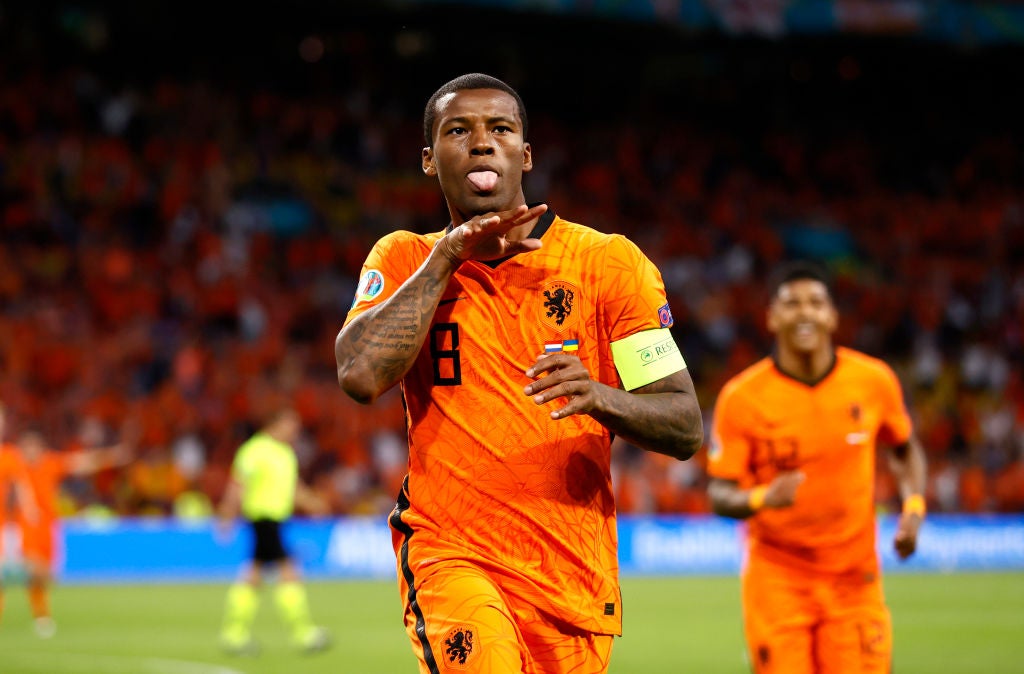Frank de Boer refusal to change Netherlands tactics amid fan pressure is rewarded but not justified
It’s not the ‘Dutch way’ by tradition, but it’s only an issue if it doesn’t yield results
“Johan Cruyff would turn over in his grave.”
It was a strong comment, taken in some locations partly without full context, but it was effective in making the point that the tactical system deployed by Netherlands under Frank de Boer has not been what fans expect, or are used to.
That the head coach’s brother, Ronald, made that comment - which went on to explain why it was also understandable that Netherlands use the 3-5-2 system and noted the validity of it on the international scene - made it all the more useable as ammunition for those who have been unhappy with the Oranje’s results ahead of Euro 2020, but boss Frank has stuck to his guns.
An enthralling, thrilling, crazy encounter in Amsterdam on Sunday night saw Netherlands win 3-2 against Ukraine, with De Boer again employing the wing-back system throughout.
Thoughts of one leading to the other and thus proving the manager’s point beyond reproach are both spot-on and wide of the mark, however: yes, the system led to exciting attacking play, but it also saw the Dutch exposed by familiar defensive problems and give up a comfortable-looking two-goal lead.
De Boer’s selections, and tactics, remain a work in progress. He can feel vindicated to an extent by the points - and the fact they’ll likely lead to qualification to the last 16 already - but the questions will continue to surround him and his organisational credentials.
It’s not as though he will claim to be unaware of the dissatisfaction.
Prior to De Boer taking over the national team job, Ronald Koeman had taken Netherlands back to a respectable level, winning games with regularity and bringing through a clutch of talented youngsters. Heading into Euro 2020, Netherlands had won five of their last 12, Poland the biggest opponents among the quintet, while games against Mexico, Turkey, Bosnia-Herzegovina and Scotland ended without victory.
Fans flew a plane over training this week, with a simple and succinct message: “Frank, just 4-3-3”.
“They say in the Netherlands that we have 17 million national-team managers. There’s always pressure. I’ve played and managed at clubs where winning is essential, so the pressure is always there,” he said before the opener.
There was never any hint of moving away from the system he has utilised thus far, while De Boer accused some of deliberately making it sound defensive by labelling the formation 5-3-2 rather than 3-5-2.
Against Ukraine, it’s easy to see some of the reasons why he wants the extra centre-back in place. Netherlands’ full-backs are extremely attack-minded; Owen Wijndal, Denzel Dumfries and Patrick van Aanholt are not noted for their defensive solidity.
Without Virgil van Dijk, there is less leadership - and pace - to rely on with just a two-man pairing. Added to that, they were without Matthijs de Ligt for the opener, meaning rookie teenager Jurrien Timber started. He impressed, but few managers would be keen to go with an untried duo in a new system for the first game of a major finals.
Further forward, playing behind the attack continues to get the best out of Gini Wijnaldum, who scored again.

A two-man attack, rather than opting for out-of-form or less-than-elite wide forwards could also see Donyell Malen paired with Memphis Depay, in time - a very mobile, free-scoring pairing to whet the appetite.
Any system needs the players to be well-organised and comfortable, and in possession that seems to be the case for the Dutch most of the time - it’s off the ball, tracking runners on counter-attacks and defending the channels particularly, which cause grief and make the formation look unwieldy.
De Boer, like several managers already at the tournament, still has areas of the team to fix, refine and choose between faces for.
The questions and critics will remain despite the win, given the nature of it in almost throwing away two points - but they won’t exist at all if the Dutch simply keep winning. It’s tough to argue with success, after all.
This was a first victory at the European Championships for over a dozen years for Netherlands. It affords De Boer more time, more breathing space and a slight sense of justification - but absolute certainty in his system will only be hard-earned if future wins are entirely more comfortable and convincing.
Join our commenting forum
Join thought-provoking conversations, follow other Independent readers and see their replies
Comments